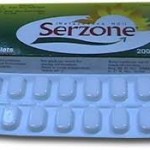- Type of Drug: Antidepressant
- Prescribed for Depression
Nefazodone General Information
Nefazodone is a unique chemical compound, unrelated to older antidepressant groups. This drug interferes with the ability of nerve endings in the brain to take up serotonin and norepinephrine, two key neurohormones. Nefazodone is rapidly absorbed, but about 80 percent of each dose is rapidly broken down during its first pass through the liver. Severe liver disease can increase the amount of Nefazodone in the body by 25 percent. Very little of the drug is released through the kidneys.
Cautions and Warnings
The possibility of suicide should always be considered in severely depressed people. High-risk persons taking this drug should be considered possible suicide candidates until they significantly improve and be carefully watched at all times.
- People with a history of seizure disorders may experience seizures while taking Nefazodone.
- Recent heart-attack patients should use this drug with caution because it can substantially reduce your heart rate.
Nefazodone Possible Side Effects
- Most common: weakness, dry mouth, nausea, constipation, blurred or abnormal vision, tiredness, dizziness, light-headedness, and confusion.
- Less common: upset stomach, increased appetite, cough, memory loss, tingling in the hands or feet, flushing or feelings of warmth, poor muscle coordination, and dizziness when rising from a sitting or standing position.
- Infrequent: low blood pressure, fever, chills, flu-like effects, joint pains, stiff neck, itching, rash, diarrhea, nausea and vomiting, thirst, sore throat, taste changes, ringing or buzzing in the ears, unusual dreams, poor coordination, tremors, stiff muscles, reduced sex drive, urinary infection and other problems, vaginitis, and breast pain.
- Rare: drug allergy, not feeling well, swelling, sensitivity to the sun, pelvic pains, hernia, bad breath, high blood pressure, dizziness, angina pains, periodontal abscess, gum disease, abnormal liver tests, tongue swelling, difficulty swallowing, stomach bleeding, liver inflammation, arthritis, eye pain, impotence, and breast enlargement.
Nefazodone Drug Interactions
• People taking Nefazodone within 2 weeks after having taken a monoamine oxidase (MAO) inhibitor antidepressant may experience severe reactions, including high fever; muscle rigidity or spasm, mental changes, and fluctuations in pulse, temperature, or breathing rate. People stopping Nefazodone should wait at least 1 week before starting an MAO inhibitor drug.
• Nefazodone increases blood levels of Astemizole and Terfenadine, two nonsedating antihistamines, leading to possible cardiac side effects associated with those drugs. It can also increase blood levels of Alprazolam and Triazolam, two benzodiazepine antianxiety drugs. (Lorazepam, another benzodiazepine drug, is not affected by Nefazodone.) Do not take these drugs together with Nefazodone.
• Blood levels of Digoxin may be substantially increased by Nefazodone. People taking these drugs together should have their Digoxin blood levels checked periodically.
• The clearance of Haloperidol, an antipsychotic drug, was drastically reduced by Nefazodone, but the implications of this are not well known.
• Nefazodone caused substantial reductions in the amount of Propranolol absorbed into the blood. At the same time, Nefazodone blood levels increased substantially. Do not take these drugs in combination.
• Drinking alcohol while taking Nefazodone can make you excessively tired. Avoid this combination.
Food Interactions
Food delays the absorption of this drug and can reduce drug levels by 20 percent. Take it on an empty stomach at least 1 hour before or 2 hours after meals.
Usual Dose
Adult: 100 mg twice a day to start. Each dose may be increased by 100 mg a week to about 600 mg a day.
Child: not recommended for use by children under age 18. Senior: start at half the regular adult dose and increase as needed up to 600 mg a day, if needed.
Nefazodone Overdosage
Symptoms of overdose include nausea, vomiting, and sleepiness. There are no reports of death due to Nefazodone overdose. Nevertheless, Nefazodone overdose victims should be taken to a hospital emergency room for treatment. ALWAYS bring the medicine bottle with you.
Special Information
Several weeks may be needed to see the effects of Nefazodone treatment. Continue taking your medicine during this time even though you may see no changes, and be sure to continue your medicine once changes have taken place.
Call your doctor at once if you develop hives, rash, or other allergic side effects while taking Nefazodone.
Because this drug can make you tired, you should be careful driving, doing complex tasks, or operating equipment while taking Nefazodone. Avoid alcoholic beverages while taking this medicine.
Check with your pharmacist or doctor before you take any nonprescription medicine because of the possibility of drug interaction with Nefazodone.
Nefazodone Special Populations
Pregnancy/Breast-feeding
Animal studies with large doses of this drug have indicated the possibility of decreased fertility and increased risk to the fetus, but no human data are available. Pregnant women or those who may become pregnant should take this drug only if it is absolutely necessary.
It is not known if Nefazodone or its breakdown products pass into breast milk. Women who must take this drug while nursing should watch their infants for possible drug side effects.
Seniors
Older adults, especially women, have difficulty breaking this drug down and should start treatment at half the usual dosage of Nefazodone. Dosage may be gradually increased as needed to the maximum recommended dosage.

